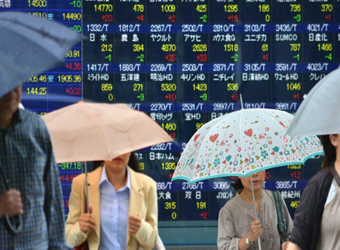Most Asian markets advanced on Wednesday, retracing losses made in the last session, after major U.S. indexes finished their Tuesday session higher.
Japan’s Nikkei 225 jumped 1.35 percent following last session’s tumble. Automakers, technology names and financials were broadly higher following broad-based declines seen in the last session: Toyota rose 3.38 percent, Sony gained 2.36 percent and SoftBank Group soared 3.47 percent.
Among other blue chips, Fanuc Manufacturing shed 0.54 percent and Fast Retailing was off by 0.07 percent.
South Korea’s Kospi reversed early gains to slide 0.63 percent. Heavyweight tech names, which were firmly in positive territory in the morning, traded mixed: Samsung Electronics slid 1.56 percent while rival chipmaker SK Hynix jumped 3.13 percent. The manufacturing sector traded in negative territory, with steelmaker Posco down 1.47 percent.
The junior Kosdaq index climbed 0.86 percent.
Over in Sydney, the S&P/ASX 200 bounced 0.89 percent as energy and materials stocks led gains. Among major miners, Rio Tinto and BHP tacked on 3.92 percent and 1.88 percent, respectively. Energy-related stocks edged up: Santos advanced 1.11 percent and Beach Energy climbed 4.22 percent.
Gold producers were among the worst-performers on the day, with the sector declining 1.81 percent.
Hong Kong’s Hang Seng Index rose 1.26 percent, tracking the move higher stateside. Gains were seen across sectors on Wednesday, with tech giant Tencent jumping 3.41 percent. Heavily weighted financial names also recorded gains: HSBC rose 1.37 percent, China Construction Bank gained 1.32 percent and Bank of China soared 1.37 percent.
Property names were a mixed picture after getting some relief earlier. China Evergrande Group rose 4.66 percent, but Country Garden slipped 0.14 percent. Meanwhile, mainland markets lagged the advance seen in most of the region. The Shanghai composite declined 0.81 percent and the Shenzhen composite was off by 0.03 percent.
Meanwhile, mainland markets lagged the advance seen in most of the region. The Shanghai composite declined 0.81 percent and the Shenzhen composite was off by 0.03 percent.
Financials traded lower: Shares of Bank of China listed in Shanghai fell 2.31 percent and Industrial and Commercial Bank of China lost 3.83 percent. Insurers also saw declines, with Ping An Insurance Group declining 3.24 percent.
On the earnings front, notable corporates due to report include Japan’s SoftBank Group, Meiji Holdings and Subaru. Australian-British mining company Rio Tinto is expected to announced annual results after the Australian market closes.
U.S. stocks closed higher on Tuesday after broadly slumping in the last two sessions. There was no obvious single reason behind massive losses seen stateside on Monday, but the sell-offs were blamed on concerns about rising interest rates, program trading and volatility funds that use leverage.
On Tuesday, the Dow Jones industrial average closed higher by 567.02 points, or 2.33 percent, at 24,912.77 after falling as much as 567.01 points earlier in the session. Other indexes also recorded gains.
The rout in global stock markets also saw Asian and European shares sell off in the last session.
The declines overnight were characterized by analysts as a correction rather than a sell-off driven by fundamentals.
“We don’t think this is the beginning of meaningful and sustained weakness for markets, but volatility is back and investor confidence has taken a hit,” said David Lafferty and Esty Dwek Roditi, Natixis Investment Managers global chief strategist and investment specialist, respectively.
In currencies, the dollar index, which tracks the greenback against six major rivals, was a touch softer at 89.596. At 12:03 p.m. HK/SIN, the dollar edged down against the yen to trade at 109.33, below Tuesday’s close of 109.59.
The Australian dollar edged down to trade at $0.7882.
Meanwhile, U.S. West Texas Intermediate futures advanced 0.8 percent to trade at $63.90 per barrel after settling lower by more than 1 percent in the last session. Brent crude futures added 0.73 percent to trade at $67.35.
Trade in the shares of Wynn Macau was halted on Wednesday, the Hong Kong stock exchange said in a notice. The trading halt follows earlier allegations of sexual misconduct against casino mogul Steve Wynn. Wynn Resorts later announced it would be accepting Wynn’s resignation as chief executive and chairman of the company.
Shares of Commonwealth Bank of Australia slipped 0.44 percent after the bank reported on Wednesday that cash profit in the six months ending December 21 shrank 1.9 percent to 4.74 million Australian dollars ($3.74 million).
Also mentioned in the statement was the the A$575 million ($454 million) in expenses related to a money-laundering lawsuit incurred by the bank. Australia’s other “Big Four” banks were mixed on the day.
Meanwhile, Premier Investments, the largest shareholder of Myer Holdings, called for a meeting to vote on removing the retailer’s board, Reuters reported.
In a release, Premier Investments said it was not in the best interest of shareholders for Myer’s existing board to “preside over another year of declining sales, eroding profits and further share price deterioration.” Myer shares were down 2.31 percent.
Source: CNBC
